The following announcement was written by the folks at Findmypast:
With updates to two record sets, it just got easier to enrich your family tree with those rich details that we're all searching for.
From North Eastern baptisms to browsable images for 207 Royal and Imperial Calendars, there's so much to explore within this week's record release. Here's a full rundown of all that's been added, including an in-depth look at the 240,324 pages we've added to our newspaper collection.
If you've got ancestors who worked in the civil service or other state institutions between 1767 and 1973, these Calendars may provide you with more information.
You can now browse images of our collection of 207 Royal and Imperial Calendars, which are exclusive to Findmypast. This new browse function allows you to search by year, and access images for each page, including the detailed indexes at the beginning which help you to navigate the book.
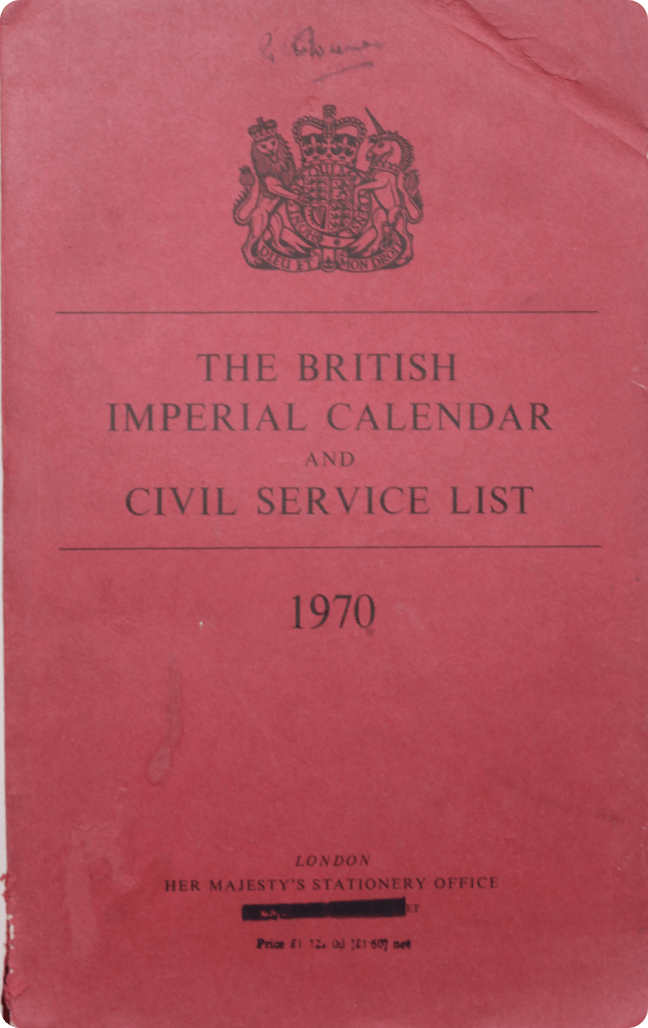
Spanning over two centuries, these catalogs provide a detailed snapshot of life in Britain at different points in history. As each book's index indicates, the information detailed includes the members of the Royal Households, the High Commissioners in London, the Cabinet, the Treasury, and the names of all those employed in Public Departments.
While the details included vary over the years, all of the catalogs list the names of people who worked for state agencies and institutions.
Although this browse-only collection cannot be searched by name, date, or keyword (you can use the Search collection of Calendars for that), filtering by year allows you to really delve into a particular time period. You can understand this rich source in its entirety by viewing the book as a whole, rather than just viewing individual entries.
A quick search for the year 1954 brings us to that year's Calendar book. It provides a fascinating glimpse into the household of the newly-crowned Queen Elizabeth II, aged just 28.
Under the entry for Buckingham Palace is a long list of noble figures, including the Earl of Scarbrough ('Lord Chamberlain'), the Duke of Hamilton and Brandon ('Lord Steward'), and the Duke of Beaufort (who was the 'Master of the Horse').
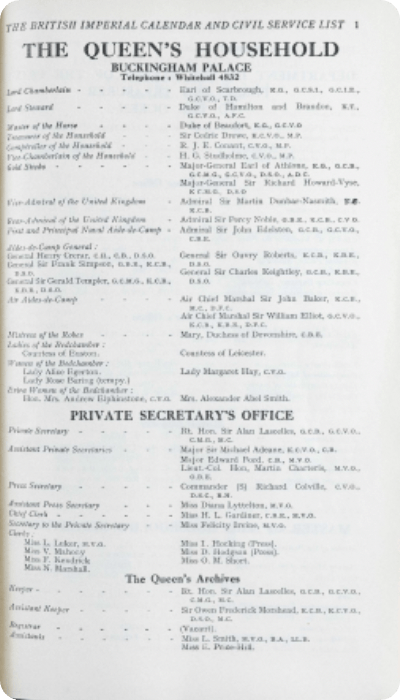
The Queen's Household in the Royal Calendar for 1954. Browse the book for yourself here.
The Queen's private secretaries are listed, in addition to the keepers of the archives and the palace's housekeeper, a Mrs J. M. Ferguson.
You can browse these books for yourself to explore your own family's connections to the Royal household. Although you might not be descended from high places, your ancestors could have played a more important role in Britain's history than you suspect, as royal household staff or state functionaries.
We've also added 12,656 records to our Durham Baptisms this week. These new records cover 11 parishes in Northumberland and Durham, spanning from 1560 to 1847.
These parishes are:
- Barnard Castle, St Mary
- Bothral, St Andrew
- Earsdon, St Alban
- Edlingham, St John the Baptist
- Esh Laude, St Michael RC
- Gainford, St Mary
- Grindon, St Thomas A Beckett
- Newcastle-upon-Tyne, St John the Baptist
- Rochester, Birdhopecraig Presbyterian
- Tynemouth, Christ Church
- Whitburn, St Mary
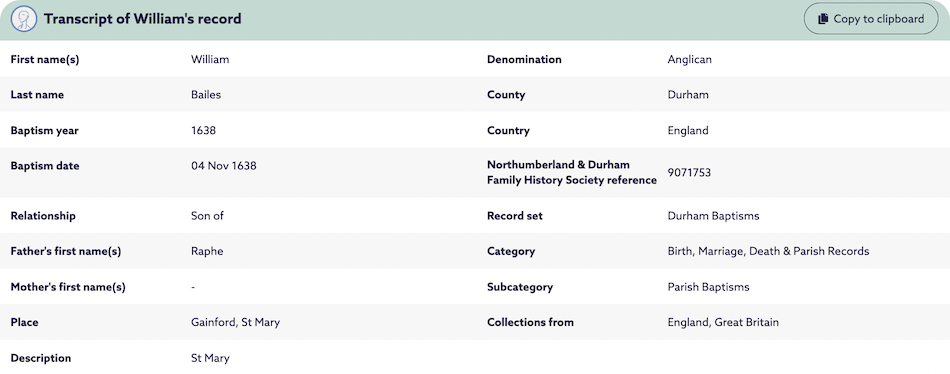
William Bailes, baptised on 4 November 1638 at Gainford, St Mary.
These transcription-only records contain the kind of key details that are the building blocks of a family tree. As the above record of William Bailes (b. 1638) indicates, you can expect to find the name of the baptised, the baptism date, the parish, and one or both parents' names.
If you've got roots in the North East of England, the Durham Baptisms collection may well help to resolve some of your unanswered questions.
We've added 240,324 new pages to our newspaper collection this week. This includes four all-new titles and updates to an existing 32.
Among this week's new additions is the Trotting World and Horse Review - a specialist title focused on, you guessed it, all things horse-related. It's a sporting publication, which described itself as a 'Journal devoted to the breeding, training and racing of trotters' upon its establishment in 1902.
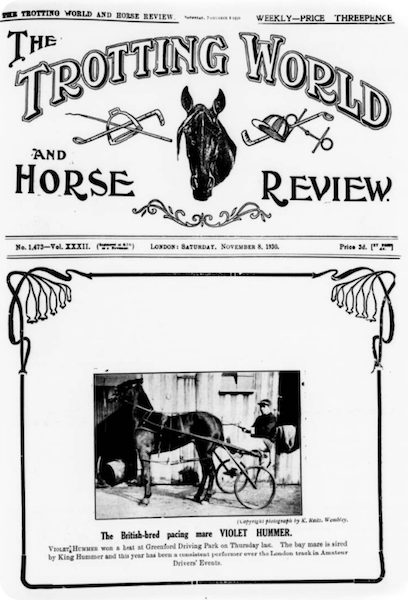
Trotting World and Horse Review, 8 November 1930.
As its name suggests, trotting involves harnessed horses, pulling a two-wheeled cart, at trotting gait. Although trotting is less popular today than it was a century ago, it remains popular among select communities.
Another notable new addition to our newspaper collection is Drakard's Stamford News, which was published by political radical John Drakard between 1809 and 1834. The publication was a platform for Drakard's radically progressive views - he spoke out about the dire living conditions in Britain and also took a stand on corporal punishment in the British Army.
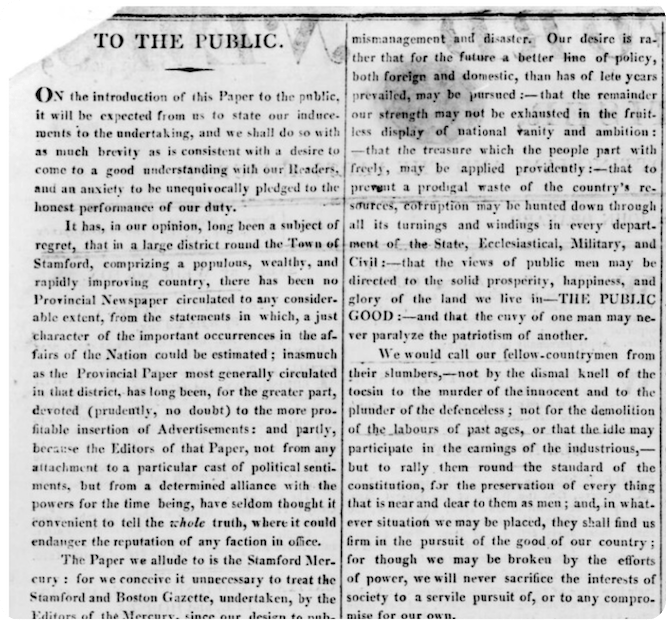
Drakard's Stamford News, 6 October 1809.
His mission was to tell the public of 'the real situation of the Country in which they live', so that they could 'test... the capacity and integrity of their Rulers'.
This, of course, made him unpopular with the British elite. In addition to facing numerous libel suits, he served 18 months in prison for his article on corporal punishment. In response to views expressed in Drakard's Stamford News, he was also the victim of a public horsewhipping by Robert Brudenell, the sixth Earl of Cardigan.
Among this week's updated titles is the Manchester Evening News, to which we've added over 36,000 new pages. Over 30,000 pages have also been added to the Welsh edition of the Liverpool Daily Post.
Here is a full rundown of all that we've added.
New titles:
- Drakard’s Stamford News, 1809-1834
- Feltham Leader, 1999
- Hinckley Echo, 1900, 1903, 1906, 1909, 1912, 1914-1915, 1917, 1919, 1921, 1924, 1927-1940, 1943-1951
- Trotting World and Horse Review, 1902-1911, 1917-1932
Updated titles:
- Acton Gazette, 1959
- Bristol Evening Post, 1988
- Derbyshire Advertiser and Journal, 1872-1877
- Dunmow Observer, 1986
- Essex & Herts Mercury, 1822, 1825, 1831, 1834-1835
- Evening Despatch, 1907
- Farnborough News, 1976-1978, 1980-1984
- Greenford & Northolt Gazette, 1990-1991
- Grimsby Daily Telegraph, 1988
- Herne Bay Times, 1986
- Hinckley Free Press, 1899
- Horncastle Target, 1999
- Hoylake & West Kirby News, 1986
- Lincolnshire Free Press, 1988
- Liverpool Daily Post (Welsh Edition), 1986-1987, 1989
- Loughborough Mail, 1986
- Manchester Evening News, 1984, 1988
- Nantwich Chronicle, 1991
- New Observer (Bristol), 1986
- Newquay Express and Cornwall County Chronicle, 1955
- Northwich Chronicle, 1991
- Nottingham Journal, 1877
- Ormskirk Advertiser, 1884
- Sheerness Guardian and East Kent Advertiser, 1866
- Shepton Mallet Journal, 1990
- South Wales Daily Post, 1919
- South Wales Echo, 1990
- Stratford-upon-Avon Herald, 1978-1980
- Walsall Observer, 1990-1991
- Western Daily Press, 1987-1988
- Widnes Weekly News and District Reporter, 1991
- Wilmslow Express Advertiser, 1986, 1991
What has your research uncovered? Whether you've solved a family mystery or managed to track down an elusive ancestor, we'd love to hear about the discoveries you've made. You can now tell us directly using this form.
 Latest News Articles
Latest News Articles If you do not see a Plus Sign that is labeled "Add comment," you will need to upgrade to either a (FREE) Standard Edition or a (paid) Plus Edition subscription
If you do not see a Plus Sign that is labeled "Add comment," you will need to upgrade to either a (FREE) Standard Edition or a (paid) Plus Edition subscription